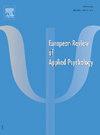Perceived body acceptance by parents, body image, and intuitive eating in adolescent girls: A look at each parent's role
IF 1.4
4区 心理学
Q3 PSYCHOLOGY, APPLIED
European Review of Applied Psychology-Revue Europeenne De Psychologie Appliquee
Pub Date : 2025-01-16
DOI:10.1016/j.erap.2024.101044
引用次数: 0
Abstract
Introduction
The perception that one's body is accepted by others is crucial in the development and maintenance of a positive body image and healthy eating behaviors in youth. However, no research has examined the relationship between perceived body acceptance by each parent and adolescent girls’ relationships with their bodies and with food.
Objectives
The present research examined whether perceived body acceptance by the father and by the mother are independently related to different facets of adolescent girls’ body image (i.e., self-objectification, body appreciation, and social appearance comparison) and to their intuitive eating.
Method
Three hundred and forty-four adolescent girls from Quebec (Canada) aged 14 to 17 years completed an online questionnaire.
Results
Perceived body acceptance by the father and by the mother were both positively and uniquely associated with adolescents’ intuitive eating and body appreciation, and negatively related to self-objectification (i.e., perceiving their bodies as objects that exist for the gaze of others). Perceived body acceptance by the mother (but not by the father) was also negatively related to social appearance comparison. Results also showed that self-objectification, social appearance comparison, and body appreciation partially mediated the association between perceived body acceptance by each parent and intuitive eating. Finally, results showed that perceived body acceptance by the father and by the mother interact in the prediction of body appreciation.
Conclusions
Perceived body acceptance by each parent is related to indicators of a positive body image and a healthy relationship with food in adolescent girls.
Public interest
The results of this study, conducted among 344 adolescent girls (14–17 years old) in the province of Quebec, show that perceived body acceptance by each parent relates to several indicators of a positive relationship with the body and food. Adolescents who perceive that their parents accept their bodies are likely to report greater appreciation of their bodies, less tendency toward self-objectification, less tendency toward social appearance comparison, and more intuitive eating behaviors. The results support the importance of examining both maternal and paternal body acceptance given their additive and interactive effects.
青春期女孩的父母对身体的接受度、身体形象和直觉饮食:父母各自的角色
认识到自己的身体被他人所接受,对于青少年发展和维持积极的身体形象和健康的饮食行为至关重要。然而,没有研究调查过父母对身体的接受程度与青春期女孩与身体和食物的关系。目的本研究考察了父亲和母亲的身体接受感是否与青春期女孩身体形象的不同方面(即自我物化、身体欣赏和社会外表比较)以及她们的直觉饮食有独立的关系。方法344名14 ~ 17岁的加拿大魁北克省少女完成在线问卷调查。结果父亲和母亲的身体接受感知与青少年的直观饮食和身体欣赏呈正相关,与自我物化(即将自己的身体视为供他人注视的客体)负相关。母亲(而不是父亲)对身体的感知接受度也与社会外表比较呈负相关。结果还表明,自我物化、社会外表比较和身体欣赏在父母对身体的接受与直觉进食之间起部分中介作用。最后,研究结果显示,父亲和母亲的身体接受感知在身体欣赏的预测中相互作用。结论父母双方的身体接受感与青春期女孩的积极身体形象指标和健康的食物关系有关。公共利益这项研究在魁北克省的344名青春期女孩(14-17岁)中进行,结果表明,父母对身体的接受程度与身体和食物之间的积极关系的几个指标有关。那些认为父母接受自己身体的青少年更有可能对自己的身体表示赞赏,更少的自我物化倾向,更少的社会外表比较倾向,以及更直观的饮食行为。研究结果表明,考虑到母亲和父亲的身体接受度的叠加和相互作用,检查它们的重要性。
本文章由计算机程序翻译,如有差异,请以英文原文为准。
求助全文
约1分钟内获得全文
求助全文
来源期刊

European Review of Applied Psychology-Revue Europeenne De Psychologie Appliquee
PSYCHOLOGY, APPLIED-
CiteScore
2.20
自引率
20.00%
发文量
38
期刊介绍:
The aim of the Revue européenne de Psychologie appliquée / European Review of Applied Psychology is to promote high-quality applications of psychology to all areas of specialization, and to foster exchange among researchers and professionals. Its policy is to attract a wide range of contributions, including empirical research, overviews of target issues, case studies, descriptions of instruments for research and diagnosis, and theoretical work related to applied psychology. In all cases, authors will refer to published and verificable facts, whether established in the study being reported or in earlier publications.
 求助内容:
求助内容: 应助结果提醒方式:
应助结果提醒方式:


